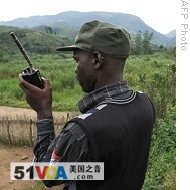Nairobi
22 January 2009
 |
| FDLR rebel watches road in Nyabiondo, 95 kilometers west of Goma, DRC, 16 Jan 2009 |
Rwandan troops crossed the border into the DRC on Tuesday. The U.N. peacekeeping mission says it does know how many Rwandan troops are in Congo, but estimates have ranged from 4,000 to 7,000.
The joint operation with the Congolese army is intended to disarm the Democratic Liberation Forces of Rwanda - a Hutu militia of about 6,000 members, many of whom participated in the 1994 genocide of Tutsis in Rwanda.
The militia and other armed groups have long been blamed for instability in eastern DRC. Rwandan troops have crossed the border on multiple occasions since 1994 to pursue rebels.
As recently as November, the DRC government accused Rwanda of supporting a Tutsi rebel group led by Laurent Nkunda in clashes with the Congolese military. But the two governments signed a deal on December 5 to pursue the FDLR.
The European Union's top humanitarian official, Louis Michel, welcomed the joint operation as an indication of the improving ties between DRC and Rwanda, and as the beginning of a solution to the instability in the region.
But the U.N. humanitarian office and international organizations Oxfam and Amnesty International warn the operation could have severe consequences for the civilian population.
The U.N. peacekeeping mission says it has been blocked from the road to Rutshuru, along which Rwandan and Congolese troops have been moving. Peacekeeper spokesman Madnoje Mounoubai said humanitarian organizations have also been prevented from traveling in the area.
"We should not be impeded on going anywhere we want to go within our area of responsibility," said Mounoubai. "The special representative has already raised concern about that. We want to be everywhere so that we can at least monitor the security of the civilians and also see where the humanitarian assistance is needed."
Concerns about the operation have also been growing with the Congolese media and political parties. Speaker of Parliament Vital Kamerhe, who belongs to President Joseph Kabila's party, expressed "astonishment" at the arrival of Rwandan troops and warned of the risk of civilian casualties. Opposition parties have also denounced the operation.
The cooperation with Rwandan troops follows an operation led by the Ugandan military against members of the Lord's Resistance Army rebels operating further north in the country. That operation, which began in December has invited retaliatory attacks by the rebels that have killed hundreds of civilians.
Troops from Rwanda, Uganda, and other African countries entered Congolese territory on several occasions during the 1998-2003 civil war, a conflict that has been blamed for five million deaths, and many in the DRC are wary of the presence of foreign troops.
Congolese officials say the operation with Rwanda is expected to last 15 days, but many expect that it could go longer. The troops have not begun launching attacks on the Hutu militia.